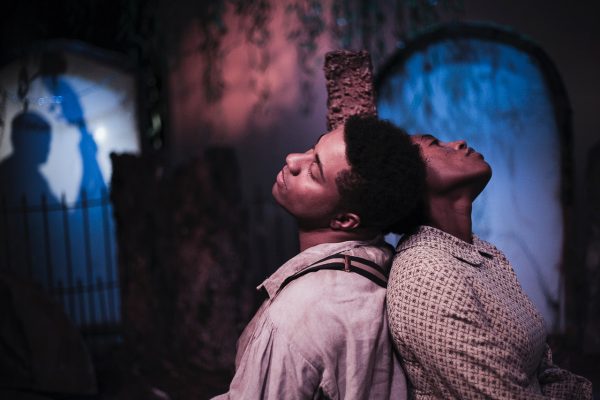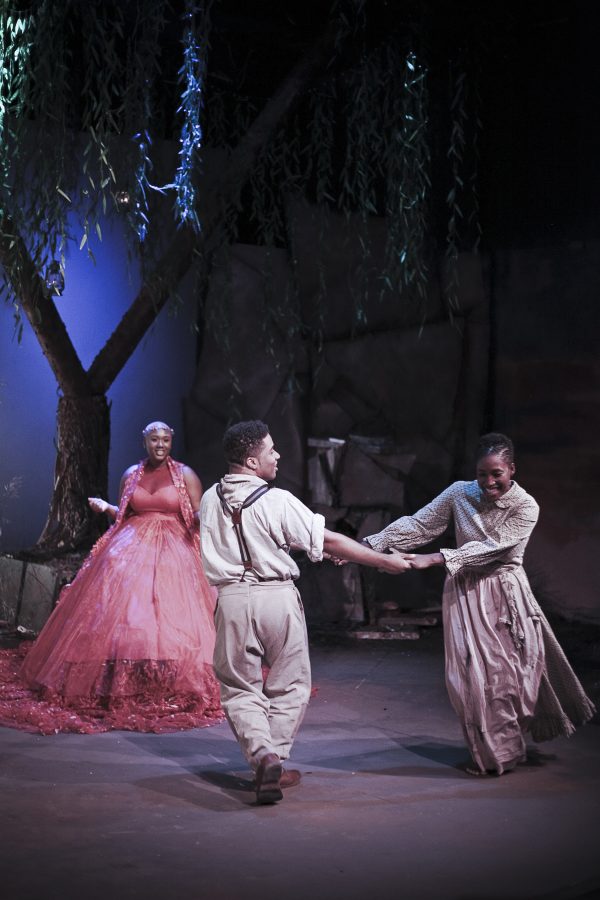There’s a young playwright in town whose name you would do well to remember. It is Dionna Michelle Daniel. She has written a theatre piece called American Saga: Gunshot Medley Part 1 that can be argued with, but not dismissed. Its American premiere is currently on stage at Rogue Machine’s MET Theatre — also announced as the company’s final production at that address, before it moves to a permanent new home at Venice’s Electric Lodge.
American Saga: Gunshot Medley Part 1, may be called a meditation, a tone poem, a monologue for four voices and some instruments. Call it whatever you like. Describe it in any way that makes sense to you. It is a piece of poetic theatre, dedicated to the memory of Betty, Alvis and George — three very real people who left not much trace behind when they passed away in the 1850s and 60s.
Their North Carolina gravestones bear only a first name and a date of death. Absent are any records of their surnames (if they had one), births, lives or the manner of their dying. Daniel attempts to fill in the blanks and punctuate her fictionalized missing record of their lives with traditional songs, the songs of the High Priestess of Souls, “the wind, incarnate of the Yoruban Orisha Oya” — and the sounds of obliterative gunshots.
I know. Obliterative is primarily a medical term, but it fits the circumstance. Daniel’s use of the truncated lives of Betty, Alvis and George is as much literal as it is symbolic, illustrating the tragically broad spectrum of unwarranted black deaths by guns and by whatever other means. She dedicates the piece to the late State Senator Clementa C. Pinckney of South Carolina, “Trayvon, Tamir, Sandra and Eric,” whom we not only remember but also cannot forget.

The setting is that of an ancient North Carolinian cemetery (design by Priti Donde), drenched in a kind of perpetual sunset (indeterminate moody lighting by Tor Brown). The roles of Betty and George are double cast and, at the performance I attended, Betty, a woman dedicated to cleaning up “the mess,” was played by Mildred Langford whose languorous eyes, demeanor and prostrate position, as she’s so often “cleaning” on all fours, broadcast the full weight of a harsh black American history.

Jon Chaffin played George, as a dreamer who cannot stop dreaming the dream, until it gets the better of him, while the exceptional, rubber-bodied Derek Jackson is the teen-aged Alvis, an uncontrollable young man in contagious perpetual motion, whose optimism knows close to no bounds.
Their actions and words are accompanied and supported by the music of Crissy Joyce’s melancholy violin, Ann Polednak’s banjo and Gerald C. Rivers’ African Conga — all three musicians appearing only as shadows behind frosted glass screens.

And then there is the propulsive, elegiac writing. Elegant, moving and rigorous. Director Desean Kevin Terry understands its importance and obeys its injunctions. Don’t look for literalness, but for a kind of floating magic realism. As in poetry, the logic is often obscured from events on stage, since it all takes place in The Hereafter — an otherwise undefined, in-between space that Daniel has invented, that lies somewhere beyond The Living but not yet among what she calls The Dead Dead.
On stage at all times with these three characters is the statuesque Yoruban High Priestess of Souls, dressed in red and embodied by the sweet-voiced Sha’Leah Nikole Stubblefield, softly humming or singing her vivid emotions and — mostly demurely — surveying the unfolding playing field…
It is an intense, yet frequently playful 70-minute chamber piece, performed without intermission and intended, like the music, to be felt rather than analyzed. It yearns simply to be experienced. Its political message is unmistakable; anybody with half a brain and a full heart can know it. But above all, it is an intelligent, intriguing and beguiling poem, rooted not in the everyday, but in a realm ruled by the heart and senses.
PS: I’m told that there is is an American Saga, Part 2, but no word on whether we’ll get to see it.
Perhaps the best news of all is that this uncommon Part 1 is moving to the Watts Labor Community Action Committee center (WLCAC) for a limited South Central run Oct. 5-14, where it will no doubt connect with its most significant audiences. Beyond that, comes Venice and a whole new life for the Rogue.
Top image: l-r, standing in the shadowed background, Derek Jackson & Jon Chaffin. Kneeling in the foreground is Mary Langford and on the right, in red regalia, is Sha’Leah Nikole Stubblefield as the High Priestess of Souls in American Saga Gunshot Medley: Part I, at Rogue Machine Theatre.
Photos by Cristian Kreckler
WHAT:American Saga – Gunshot Medley: Part 1
WHERE: Rogue Machine at The MET Theatre, 1089 N. Oxford Ave., Los Angeles, CA 90029.
WHEN: Fridays, Saturdays & Mondays, 8pm; Sundays, 2pm. Thru Sept. 23. Added performance Thursday, Sept. 20 only, 8pm.
The show moves to the WLCAC Theatre, 10950 S. Central Ave, Los Angeles, CA 90059 on Friday, Oct. 5, with performances Fridays & Saturdays, 8pm; Sundays, 2pm. Ends Oct. 14. Performances on Oct 5, 7 & 14 include a guided tour of the Civil Rights Museum.
HOW: Tickets, $40 at The MET, $35 at WCLCAC, with Pay-What-You-Can at the door for local Watts audiences. Reservations: 855-585-5185 or at www.roguemachinetheatre.com Group discounts for 15 or more through Julie at AmericanSagaGroupTix@gmail.com
